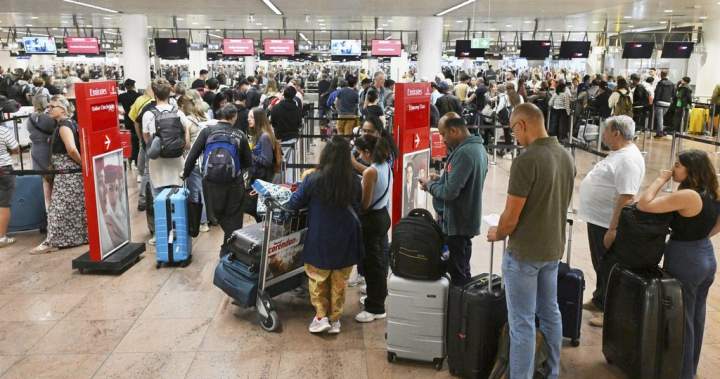Many Canadian travellers to Europe are being asked to reveal more about themselves as officials begin to usher in new security measures.
European countries are rolling out a border management system to register people for short stays and, starting late next year, many visitors will need to obtain electronic travel authorizations in advance.
The first initiative, the Entry/Exit System, is intended to modernize border management across the 29 European countries using the system by electronically registering non-European nationals’ entries, exits and entry refusals.
The system, which is set to be fully in place by April 10, applies to visitors with short-stay visas as well as travellers — including many from Canada — who do not need a visa to stay for a maximum of 90 days in any 180-day period.
The system uses various means, including electronic kiosks, to collect facial images and fingerprints to verify identities. Officials say the biometric data will help determine whether people are exceeding their permitted stay and contribute to the fight against organized crime and terrorism.
The Entry/Exit System was set up because European countries have for too long lacked a centralized overview of people entering, leaving and staying, said Uku Sarekanno, deputy executive director of Frontex, the European border and coast guard agency.
Get daily National news
Get the day’s top news, political, economic, and current affairs headlines, delivered to your inbox once a day.
“In Europe, if you look at the figures, irregular migration is down,” Sarekanno said during a recent visit to Ottawa to meet counterparts. “At the same time, the topic as such is very high on the political agenda.”
The new measures address these voter concerns and help build “trust in the system,” he added.
Beginning some time late next year, the second measure — the European Travel Information and Authorization System, or ETIAS — will come into effect. The travel authorization will be an entry requirement for visa-exempt nationals travelling to any of 30 European countries.
In 2016, Ottawa began requiring most visa-exempt visitors flying to Canada to have such a document, known as the Electronic Travel Authorization.
Beginning late next year, the ETIAS travel authorization will be available for purchase through an online portal for 20 euros. Applicants under age 18 or older than 70 are among those exempt from payment.
Officials say most applications will be processed within minutes, although some might take longer.
The travel authorization requirement will give European border officials advance warning of who is coming before they get on a flight, Sarekanno said. “The risks need to be better managed.”
The ETIAS travel authorization, linked to a visitor’s passport, will be valid for up to three years or until the passport expires, whichever comes first.
The document allows the holder to enter participating countries as often as they wish for short-term stays. Officials caution, however, that the travel authorization does not guarantee entry and a border guard will still ask to see a passport and other documents.
Travellers will be advised to apply for a travel authorization before purchasing an airline ticket or booking accommodation.
Officials warn that online scammers are already trying to profit off the ETIAS — even though it doesn’t exist yet.
Sarekanno said officials hope the new measures will lead eventually to a faster and more seamless experience for travellers at European borders, and free up border officers for other tasks.
“But it all takes time,” he said. In the next few years, he added, “we will be busy with all the implementation of it, and then we can build on top of that.”
© 2025 The Canadian Press
https://globalnews.ca/news/11517876/cda-eu-travel/


